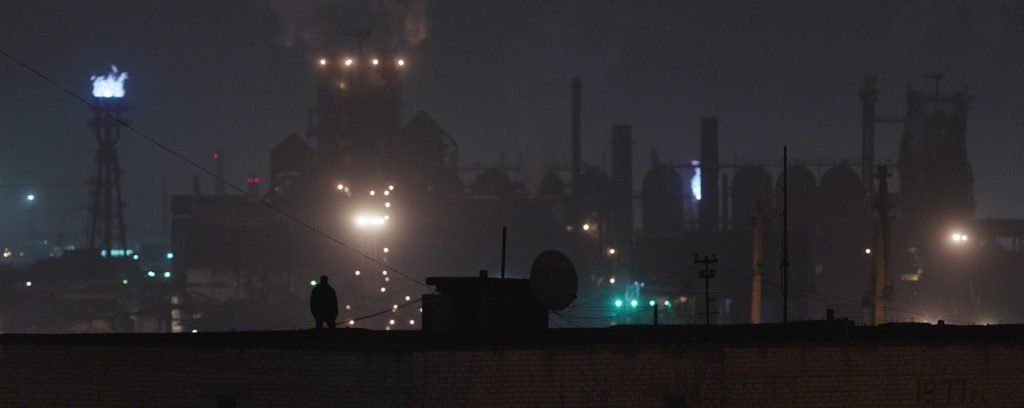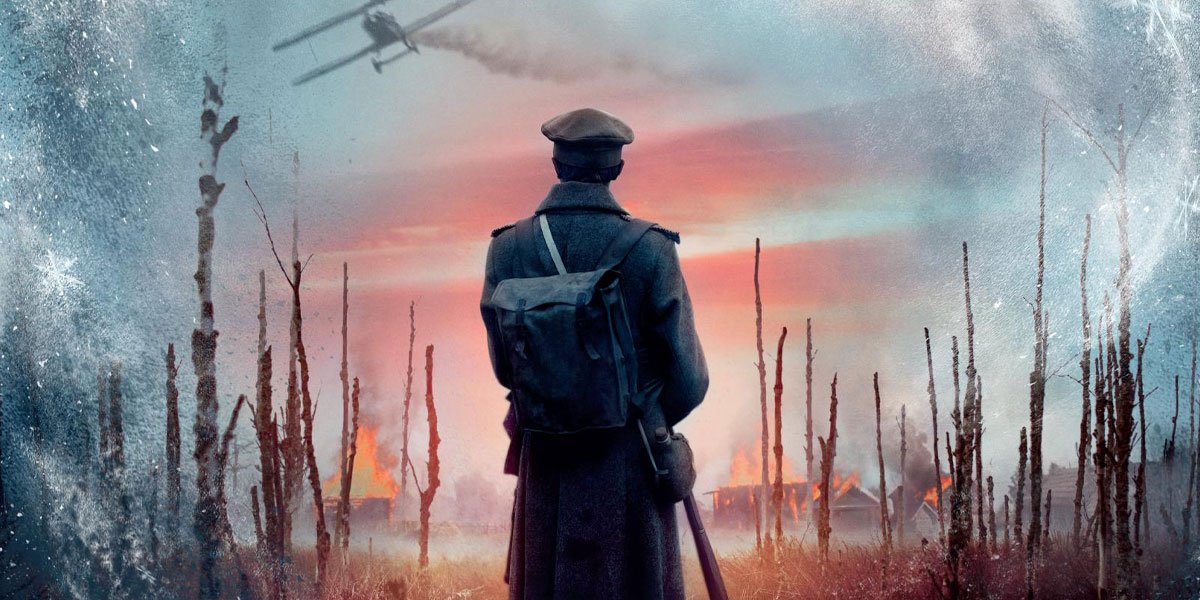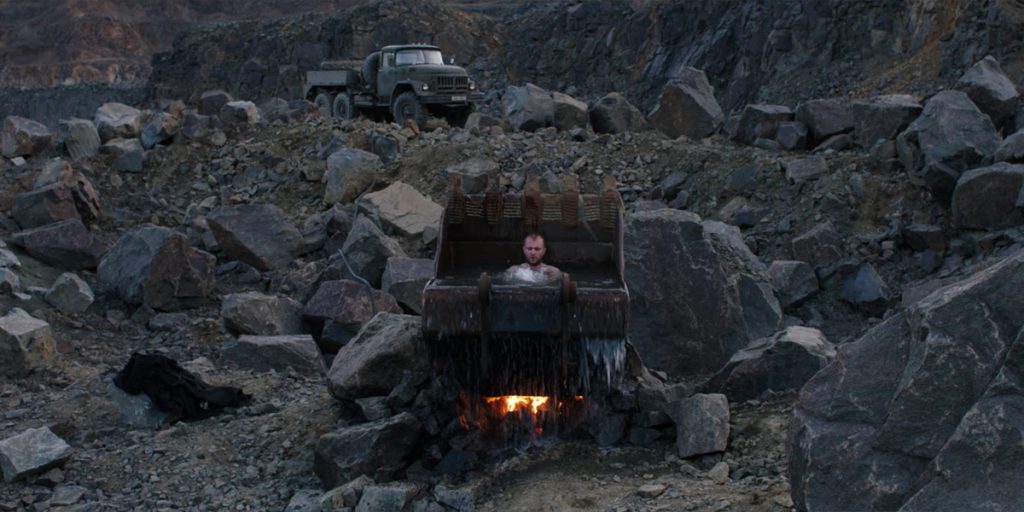Post-apocalyptic drama Atlantis strikes with its realism, and offers a new, personal perspective on the war in Eastern Ukraine.
The Russo-Ukrainian War, a protracted military conflict between Ukraine and Russia over the status of the Ukrainian regions of Crimea and Donbas, broke out in 2014 in Eastern Ukraine, not far from the Russian border. I was a 13-year-old child back then, and I recall my mother switching off the TV so that I wouldn’t see and hear the horrible events happening in our country. Pushing a button to turn off the TV is easy, but you cannot switch off reality. A lot of films are dedicated to this war, but Ukrainian director, producer and DOP Valentyn Vasyanovych takes a brand new approach, telling an original story and showing how much a country and a civilian’s lives can be destroyed by such an unfair phenomenon as war. Not only is Atlantis based on real-life events, but it also features real forensic experts and soldiers. Nevertheless, it is essential to keep in mind that it is also a sci-fi drama, whose events take place in post-war Eastern Ukraine in 2025; therefore, it’s left up to the viewers to distinguish between what is real and what is not.
Destroyed factories, broken families, environmental catastrophes – all the unavoidable consequences of war are there. But what is even more heartbreaking is the fact that young men who went to fight for their country’s freedom, received nothing but deep wounds and post-traumatic syndrome in return. One of the soldiers is Sergiy (Andriy Rymaruk), the film’s protagonist: he has a tough time recovering from PTSD, as, instead of an expected bright future, he gets to dig up corpses along with the other volunteers. The decision to choose Andriy Rymaruk, an actor who has had “active military experience”, for the leading role, paid off: of all actors, Rymaruk could relate to the script and the character’s emotions. He is evidently familiar with the surroundings and post-war atmosphere; thus, he acts with such ease.
Our protagonist’s life gradually acquires meaning again once he meets Katya (Liudmyla Bileka) and starts volunteering along her side. Both of them had regular jobs and normal lives before the war started, and now, in 2025, they are stuck in a land full of ruins, exhuming war corpses. At the same time, they are also attempting to fall in love with each other. Sergiy and Katya bond over these unfortunate events, as well as a sense of duty to their homeland, and their passionate desire to feel alive and loved once again. War leaves an everlasting mark on people’s lives: in Sergiy’s own words, going through such experiences makes it “harder to live among ordinary people”.

And Katya and Sergiy are indeed ordinary people with ordinary needs and dreams, but they are also two people who had to go through extraordinary events, like facing death. Their down to earth dialogues about death and life, and the past and the future, make the viewers empathise with the characters. Even though the have been given a chance to flee the country, Sergiy and Katya are not trying to romanticise their lives: instead, they are patriotically fighting for their future and embracing the harsh reality.
Atlantis is rather slow-paced, with minimum cuts and editing. The director chose to implement the use of single frame scenes, which is achieved by keeping the camera still and having the actors move around the set frame. While Vasyanovych explained in one of his interviews that this technique could help imitate real-life situations and therefore stimulate stronger emotions, I found that it made the film less dynamic. In fact, this cinematography technique is mostly used in documentaries and works perfectly within that genre. Here, camera movement and shots from different angles would have helped enhance the film’s unique, engaging plot.
For instance, a scene of the film shows Sergiy enter a destroyed home and pick up the shoes of a child: this is a vital scene in the movie, as the shoes can be seen as a symbol of the life that was once present in that house. It’s also meant to be an emotional scene, and it would have been effective to have had the camera zoom in on Sergiy’s face, to intensify his emotions. Yet, the camera stays still, and, with no narrator, no background music, and no comment from Sergiy, the viewers are left to wonder about the person who used to inhabit that place. Do these shoes belong to a child? Where are his/her family now? Are they alive or not? Though the answers to these questions are never revealed in the film, the director’s intentions are clear – he leaves the scenes raw and unedited on purpose, to replicate reality in the best way possible.
Atlantis is an original work of art, and a story of lost and found hope. Sergiy loses his hope for a better future, but then suddenly finds it in the relationship with Katya. In the last scene, we observe both of them from a distance, standing on the rooftop of an old building. Even though the view they stare at is gloomy and disheartening, they seem to be ready to face it. The film’s open ending leaves us pondering about how the characters’ lives will change from now on. Even though open endings are often unsatisfying, it is vital in this case.
Sergiy’s internal conflict is resolved, as he finds new meaning to his life in the middle of ruins and corpses, and decides to struggle through with Katya. As Sergiy says, “you either take yourself as you are or just disappear”: this highlights that he recognises the necessity of accepting his trauma and adapting to the new reality. It is definitely not a happy one, but it is a promising ending.
Atlantis is nothing less than plain, raw post-war reality, with no embellishments. Since the film’s events take place in the future, Atlantis falls under the sci-fi genre. But the sad truth is that, if humanity continues to provoke conflicts and war, Vasyanovych’s dystopian future is soon to be our present.
Atlantis opens in Virtual Cinemas (US) on January 22, 2021.

 loudandclearreviews.com
loudandclearreviews.com
